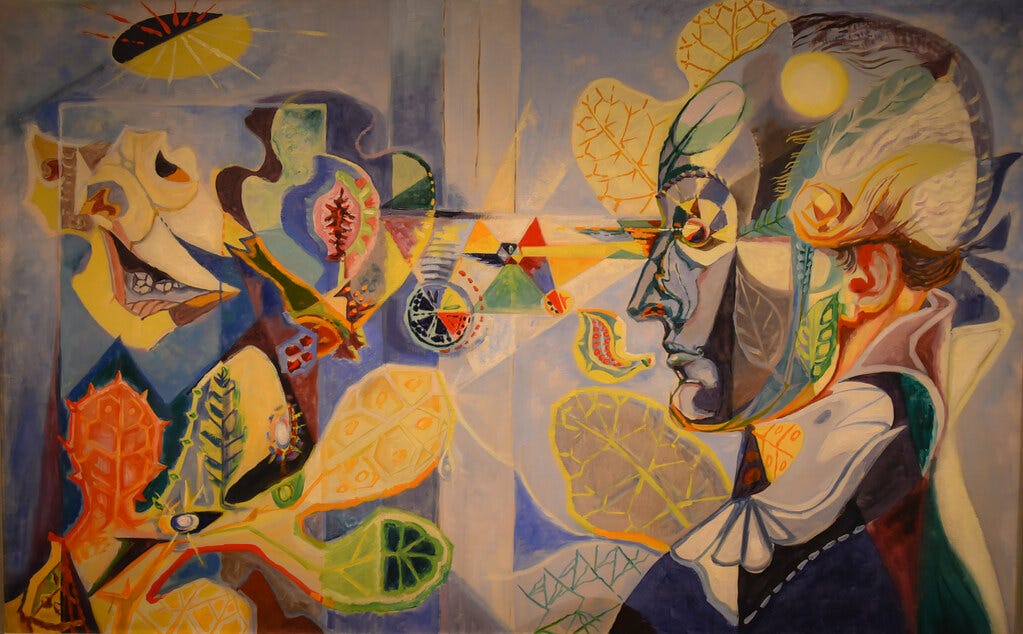Metamorphosis: Revisioning the Self After Modernity
June 28 is the start of my new online course. Lesson I is free and open to the public.
Summer classes are now in session.
I am pleased to announce to my readers that my new online course, “Metamorphosis: Revisioning the Self After Modernity,” is now open for registration.
It starts on Saturday, June 28 and runs for five consecutive weeks.
Lesson I, “Paleolithic Retrievals,” serves as an introduction to the course and will be offered free and open to the public. You can register for it here:
Read the full course description for Metamorphosis and enroll here:
So, what is Metamorphosis about?
I describe it as an imaginative exercise in “ecological self-fashioning.”
Together our class will inquire:
What does it mean to be human in an era of the so-called posthuman?
How is selfhood transforming in an age of ecology?
Which modern narratives about human nature need to be composed, and which are in need of something more akin to a mutation?
Can elements of the modern self be rendered ‘tentacular', as Donna Haraway describes?
What if we ecologized those cherished ideas about human nature, like the Renaissance notion of self-fashioning? What would happen if they were democratized, and found throughout the living world?
Finally, but perhaps most important of all:
In a time of dramatic upheaval and worldview transition, can we embrace certain modern values, especially those concerned with human potential, and worldview transformation, without falling into the same old anthropocentric trap?
In order to answer these questions, Metamorphosis suggests that modernity is in the midst of an ecological mutation.
The once-privileged anthropocentric conceptions of human nature are in need of a metaphysics of the tentacular; a wider and wilder perception that is adequate for a time of ecological homecoming.
When we see ourselves as transversal beings, beings capable of making and remaking ourselves while remaining in radical, ecological relation, we exceed the cultural limitations of the present. We make possible other kinds of planetary futures beyond that of collapse, or foreclosure.
From the course description:
Modernity, since the Renaissance, has championed the human freedom to ‘self-fashion.’ But new views of nature continue to de-center the human. Gaia, after all, is the great self-fashioner, and every “I” is teeming with the Other. Every “I” is a holobiont, a consortium of creatures and critters that have been in the business of self-fashioning for billions of years. This course invites participants to reconsider the self as a relational being in a world, as the philosopher Jean Gebser describes, “without opposite.”
New views of nature have exploded the self into living technicolor. The new ‘self’ is multiple. Every “I” is an ecology of selves. Enter the ‘holobiont.’
With these ecological insights in mind, our course is free to turn to a diverse set of thinkers that help to prepare a philosophical groundwork for our re-visioned model of human nature.
We will explore Henri Bergson’s evolutionary metaphysics, the ‘Sorcerer’ of Gilles Deleuze, and the ‘Shapeshifter/La Naguala’ of Gloria Anzaldua and indigenous Mexican philosophy. We will consider Jean Gebser’s descriptions of ‘integral consciousness’ and what he calls homo integer, the ‘integral yoga’ of the revolutionary mystic of Sri Aurobindo, as well as the kaliedoscopic holism of media theorist Marshall McLuhan.
True self-fashioning, we will come to see, does not place us outside of nature, nor does it make us the center of this nature. We find ourselves, instead, in the ecological middle. At the heart of creation we find no center. Only radical relation. We find that human nature, and therefore nature, is a site of mutual becoming, and mutual imbrication.
Another word for this, the course suggests, is metamorphosis.
Course Outline
June 28 Lecture 1: Paleolithic Retrievals [Free registration, sign up here]
July 6 Lecture 2: The Renaissance Goes Tentacular
July 13 Lecture 3: Shapeshifting Selves
July 20 Lecture 4: Homo Ludens, or Homo Integer?
July 27 Lecture 5: Metamorphosis, or Towards a Philosophy of the Future
Please note that all lectures and discussion groups will be recorded and made available to students on the Mutations site throughout the duration of the course.
The site also includes a course-specific discussion forum and a section for course materials.
Paleolithic Retrievals
Curious to learn more about the introductory session?
As this is a course exploring human nature, it felt appropriate to begin with a retelling of the human origin story. This story, as I write about in the course description, is a revisioning in that it emphasizes different elements, and these in turn tell us something about who we are as ecological beings. Metamorphic beings. Beings of the middle.
The idea for the course began with this lesson, this narrative about human plasticity and the philosophers whom I found had helped illuminate its meaning. It is through this revisioned history of human origins that the rest of the course follows.
If history is being re-visioned, and the history of human origins, in particular, has been a story replete with variation, institutional plasticity, and reinvention, what new images of human identity come to the fore? How does a re-visioned history also help us to re-constitute models of human identity?
This course begins by looking back to the explosion of creativity and consciousness that characterized the Upper Paleolithic, drawing a series of revised insights concerning the protean nature of human nature. If human consciousness and culture has—for the majority of its long history—been capable of making and unmaking self and world, shifting back and forth between alternative forms of social organization as well as ‘structures’ of consciousness, then our models of human nature and development are in need of dramatic re-visioning: what we need are new models that help us to center the emergent meta-themes of plasticity, integrality, and what French philosopher Felix Guattari calls ‘transversality.’
The ‘paleolithic retrieval’ recasts human beings as transversal beings, which is to say, beings of the ecological ‘middle.’ The human species has long inhabited the liminal, metaxy, or what Gloria Anzaldua calls nepantla.
Since the eruption of creativity and consciousness in the Upper Paleolithic, we have moved back and forth between possibilities. We have called the ecological middle, the heart of relation, our home.
You can read more about the course on the Metamorphosis description page.
As always, if you need a student discount registration link, please reach out and let me know. No one will be turned away.
Be seeing you in class.
Keep reading with a 7-day free trial
Subscribe to Mutations to keep reading this post and get 7 days of free access to the full post archives.






